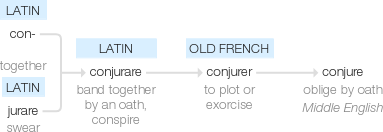Conjure
Middle English (also in the sense ‘oblige by oath’): from Old French conjurer ‘to plot or exorcise’, from Latin conjurare ‘band together by an oath, conspire’ (in medieval Latin ‘invoke’), from con- ‘together’ + jurare ‘swear’.
wiktionary
From Middle English conjuren, from Old French conjurer, from Latin coniūrō(“I swear together; conspire”), from con-(“with, together”) + iūro(“I swear or take an oath”).
etymonline
conjure (v.)
late 13c., "command on oath;" c. 1300, "summon by a sacred name, invoke by incantation or magic," from Old French conjurer "invoke, conjure" (12c.) and directly from Latin coniurare "to swear together; conspire," from assimilated form of com "with, together" (see con-) + iurare "to swear," from ius (genitive iuris) "law, an oath" (see jurist).
The magical sense is from the notion of "constraining by spell" a demon to do one's bidding. Related: Conjured; conjuring. Phrase conjure up "cause to appear in the mind" (as if by magic) attested from 1580s.
